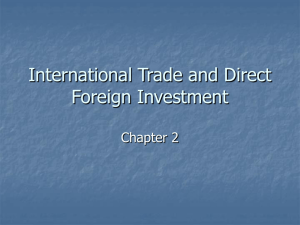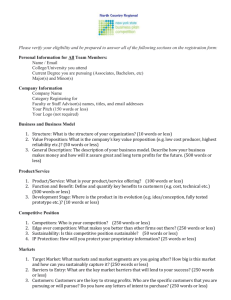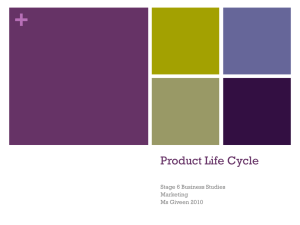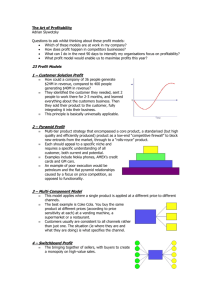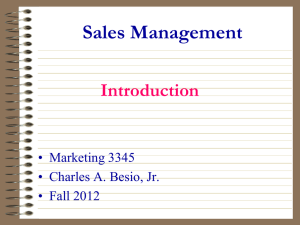Part 04-03-03
advertisement
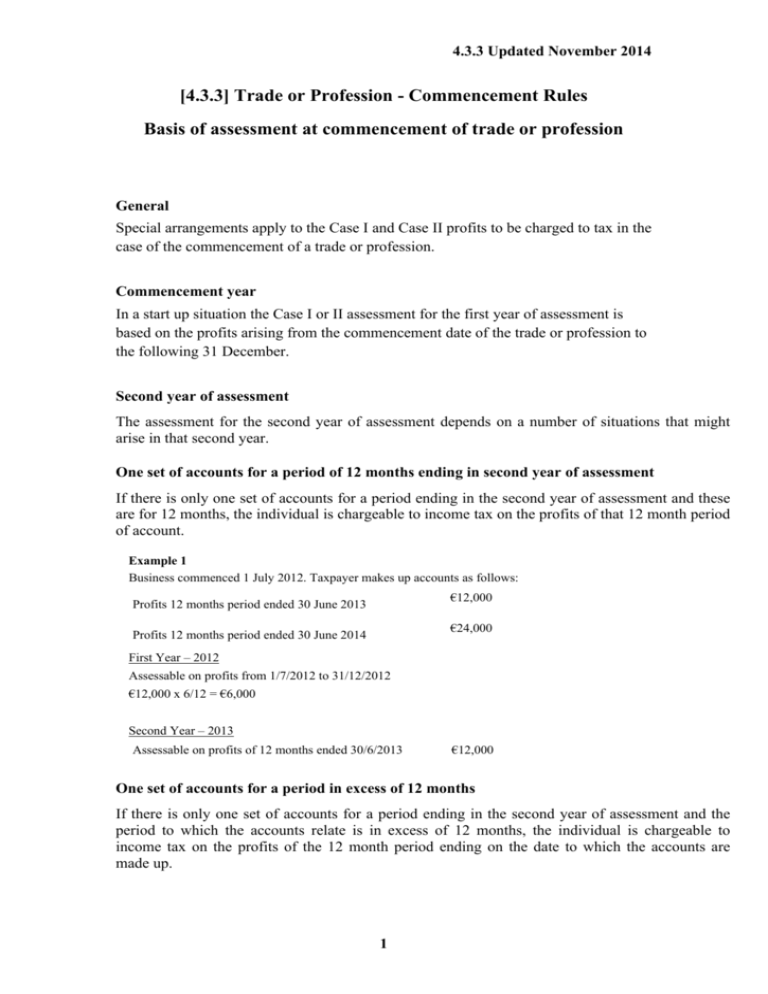
4.3.3 Updated November 2014 [4.3.3] Trade or Profession - Commencement Rules Basis of assessment at commencement of trade or profession General Special arrangements apply to the Case I and Case II profits to be charged to tax in the case of the commencement of a trade or profession. Commencement year In a start up situation the Case I or II assessment for the first year of assessment is based on the profits arising from the commencement date of the trade or profession to the following 31 December. Second year of assessment The assessment for the second year of assessment depends on a number of situations that might arise in that second year. One set of accounts for a period of 12 months ending in second year of assessment If there is only one set of accounts for a period ending in the second year of assessment and these are for 12 months, the individual is chargeable to income tax on the profits of that 12 month period of account. Example 1 Business commenced 1 July 2012. Taxpayer makes up accounts as follows: €12,000 Profits 12 months period ended 30 June 2013 €24,000 Profits 12 months period ended 30 June 2014 First Year – 2012 Assessable on profits from 1/7/2012 to 31/12/2012 €12,000 x 6/12 = €6,000 Second Year – 2013 Assessable on profits of 12 months ended 30/6/2013 €12,000 One set of accounts for a period in excess of 12 months If there is only one set of accounts for a period ending in the second year of assessment and the period to which the accounts relate is in excess of 12 months, the individual is chargeable to income tax on the profits of the 12 month period ending on the date to which the accounts are made up. 1 4.3.3 Example 2 Business commenced 1 September 2012. Taxpayer makes up accounts as follows: Profits 14 months period ended 31 October 2013 €28,000 First Year – 2012 Assessable on profits from 1/9/2012 to 31/12/2012 €28,000 x 4/14 = €8,000 Second Year – 2013 Assessable on profits of 12 months ended 31/10/13 €28,000x 12/14 = 24,000 More than one set of accounts for periods ending in second year of assessment If there is more than one set of accounts for periods ending in the second year of assessment, the taxpayer is assessable on the profits of the 12 month period ending on the date to which the latest such accounts are made up provided that date is at least 12 months after the commencement of the trade or profession. Example 3 Business commenced 1 October 2012. Taxpayer makes up accounts as follows: Profits 6 months period ended 31 March 2013 €18,000 Profits 7 months period ended 31 October 2013 €21,000 First Year – 2012 Assessable on profits from 1/10/2012 to 31/12/2012 €18,000 x 3/6 = €9,000 Second Year – 2013 Assessable on profits of 12 months ended 31/10/2013 (i.e. 5 months to 31/3/2013 plus 7 months ended 31/10/2013) (€18,000 x 5/6) + €21,000 = €36,000 Other cases In all other cases the assessment for the second year of assessment is based on the full amount of profits in the year of assessment, i.e. on a calendar year basis. This method of assessment will arise where there is no accounting period ended in the second year of assessment or where one accounting period ends in the second year of assessment 2 4.3.3 Updated November 2014 and this accounting period ends less than 12 months after the date of commencement of the trade or profession. Third year of assessment The assessment for the third year of assessment is based on the normal rules of section 65 (normally the latest 12 month period of account in that year). However, where the amount of the assessment for the second year of assessment exceeds the actual profits of that year, the taxpayer may elect in writing to have the assessment for the third year of assessment reduced by the excess. A claim for this treatment must be made with the return of income required under Chapter 3 of Part 41A. Where the reduction cannot be given full effect in the third year of assessment due to insufficiency of profits, the balance may be treated as a loss for the purposes of section 382 (which allows the carry forward of losses to future years) and carried forward and relieved in a subsequent year of assessment. Example 4 Business commenced 1 July 2012. Taxpayer makes up accounts as follows: Profits 12 months period ended 30 June 2013 €16,000 Profits 12 months period ended 30 June 2014 €12,000 Original assessments will have been made as follows: 1st year – 2012 (basis period 1/7/12 – 31/12/12) Assessable profits €8,000 2nd year – 2013 (basis period 1/7/12 – 30/6/13) Assessable profits €16,000 3rd year – 2014 (basis period 1/7/13 – 30/6/14) Assessable profits €12,000 The taxpayer may claim, when submitting the return of income for the year of assessment 2014, to have the assessment for that year reduced by the excess of the assessed profits for the year of assessment 2013 over the actual profits for the year of assessment 2013 (1/1/13 to 31/12/13). Assessed profits for 2013 €16,000 Actual profits (ie. 6/12 of y/e 30/6/13 + 6/12 of y/e 30/6/14) €14,000 Excess €2,000 The revised assessment for 2014 is €10,000 (i.e. €12,000 less €2,000). 3 4.3.3 4


